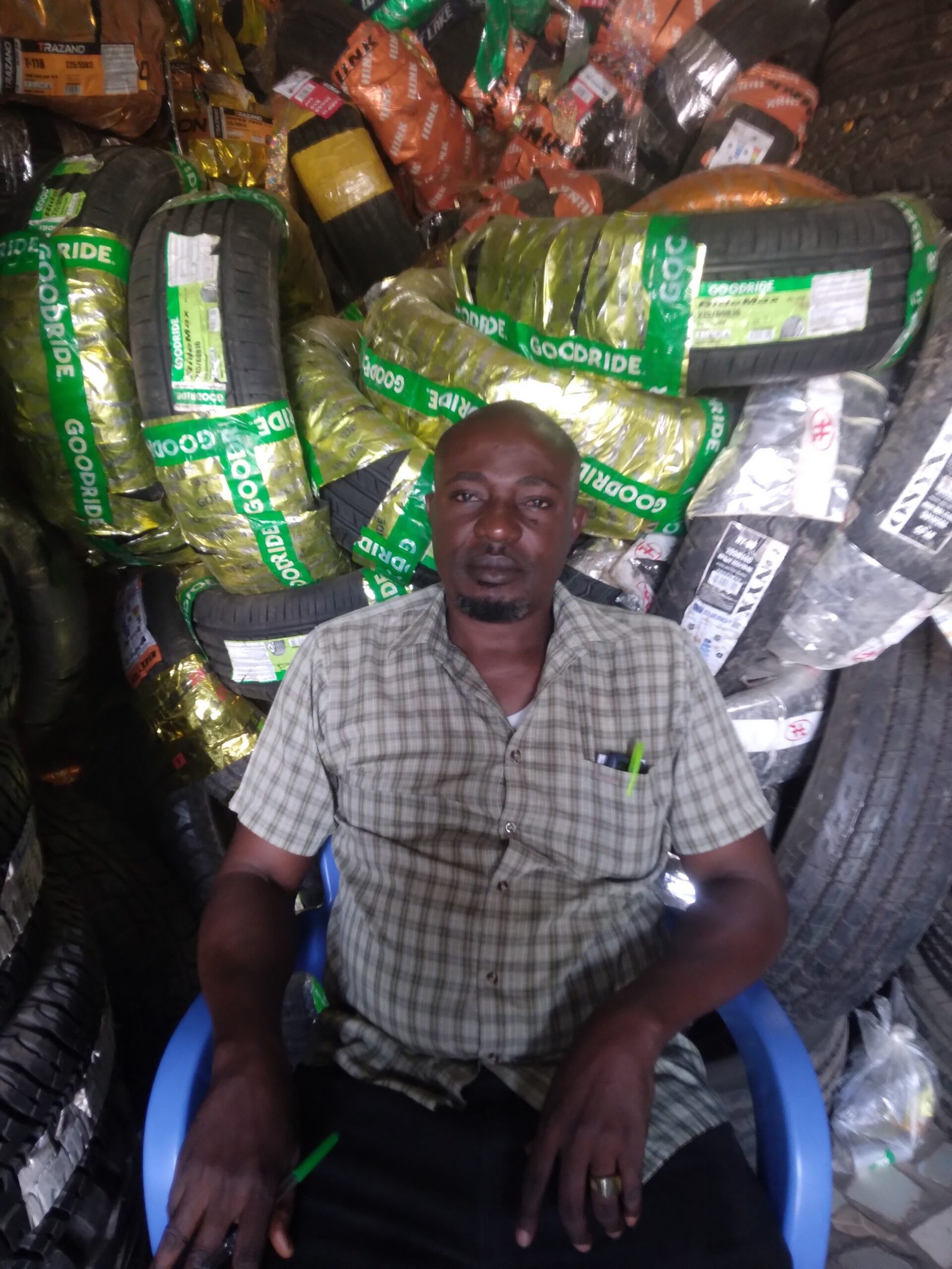
Vice chairman, Association of Spare parts dealers, Mr. Umeajaghaku Jude
ABUJA, Nigeria – For months, commuters across Abuja have fumed at the escalating cost of transport. From Gwagwalada to Kubwa, Lugbe to Nyanya, a simple journey to work now feels like a luxury. The popular explanation — fuel price hikes — tells only half the story.
In this report, Oluwafunbi Bello digs beneath the surface to uncover the real engine behind rising fares: the unprecedented spike in vehicle spare-parts prices, compounded by foreign-exchange volatility, import dependency, customs duty shocks, and the crushing daily realities faced by commercial and ride-hailing drivers who must “balance” returns to vehicle owners while keeping their cars on the road. What emerges is a portrait of a transport economy under siege, where the invisible cost of maintaining a single vehicle is quietly reshaping mobility, livelihoods and daily life in Nigeria’s capital city.
“IT’S NOT FUEL ALONE”: DRIVERS FIGHT TO SURVIVE
For Mr Simon Job, a commercial driver who plies the Wuse–Garki axis, the pressure has never been this intense.
“The price of transportation in Abuja is not high because of fuel alone,” he said, leaning against his Toyota as he waited for passengers. “The engine oil that I used to buy for ₦7,000 three to five years ago is now ₦22,000.”
Many drivers do not own their vehicles. They must remit daily “balance” payments to car owners, pay union dues, buy fuel, feed their families, and still save for inevitable repairs. For ride-hailing drivers, commissions deducted by app companies add a further layer of pressure.
“By the time you settle the owner, settle the union, fuel the car, and fix one problem or the other, what is left is nothing,” Simon said. “If we don’t increase the price, we cannot survive.”
THE TRIPLE THREAT DRIVING PRICES OUT OF CONTROL
In Dei-Dei and Zuba — Abuja’s biggest spare-parts markets — the crisis is written on the faces of traders.
Mr Umeajaghaku Jude, Vice Chairman of the Spare Parts Association and a veteran of over three decades in the business, listed three forces wrecking the market to include the Dollar’s Relentless Rise said, “Most of the goods are imported, and we buy them in dollars,” he said. “When the dollar rises, everything rises. The naira is no longer predictable.”
According to him, what traders pay at the port has become nearly unbearable.
“The importation duty is almost as much as the money spent on the goods. No businessman will pray to do business with no profit.”
Transporting goods from the ports to Abuja now costs almost double what it did three years ago — another cost passed to traders, then to drivers, and finally to commuters.

During a recent visit by Africa Health Report, (AHR’s) correspondent to Zuba auto spare parts international market, one of Africa’s largest spare parts hubs in Abuja, our correspondent gathered that Toyota corolla brake pads, which were formerly selling for ₦3,000 now sell for ₦8,000–₦12,000, while a 4-litre Total engine oil that previously cost ₦6,000 has skyrocketed to ₦25,000 and the prices of tires that sold for ₦18,000 now cost ₦35,000–₦40,000.
Also, the price of a fairly used fuel pump for Toyota Corolla has gone up to ₦30,000, while fairly used bumper for the same vehicle has gone up to ₦45,000 from ₦15,000 which was formerly sold.
A spare parts trader, Mr. Joe, with 20 years in the business, summarised the crisis simply:
“Dollar rate, delivery fees, and customs duty — that is what is killing the market.”
A similar sentiment was echoed by a lubricants seller, Godwin who sells at zuba market: “The market is now at the mercy of foreign exchange. If the dollar goes up in the morning, we change the price by afternoon.”
FOR COMMUTERS, THE PAIN IS DAILY — AND HEAVY
Higher spare-parts prices mean higher maintenance costs. Higher maintenance costs mean higher fares. The chain is simple — and devastating.
Civil servant Miss Adebimpe said transport now consumes most of her monthly salary.
“The transportation I spend in a month is more than half of my salary.”
To cope, she treks long distances before boarding a vehicle. She is not alone.
Workers coming from Kubwa, Gwagwalada, Nyanya, Mararaba, Lugbe and other suburbs say they spend ₦2,000 to ₦3,500 daily just getting to work.
For households with one income earner, transportation now competes with food, school fees, rent and medical costs.
A Lugbe resident described the new reality: “Transport to town alone can finish your salary. Even students are dropping out or deferring semesters because they can’t keep up.”
THE ECONOMIST’S WARNING: “THIS IS A STRUCTURAL FAILURE”
Economist Mr. Abdulnaseer says Abuja’s transport crisis reflects a deeper national weakness.
“The vehicles, the spare parts, and the lubricants in Abuja are imported and not manufactured here in Nigeria,” he explained. “They are imported at high prices, and the dollar rate is not specific. It changes persistently.”
He calls the rising fares “a symbol of structural weakness in Nigeria’s import-dependent economy.”
Short-term palliatives, he warned, will do little.
His recommended long-term solutions include Local Manufacturing of Automotive Spare Parts and Lubricants, Nigeria must reduce dependence on imports that are vulnerable to forex instability, Expanding Train Lines Across Abuja, a functional rail network would ease pressure on road transport, reduce fares, and support urban mobility.
Without these reforms, he warns, Abuja risks an unsustainable cost-of-living spiral.
THE PSYCHOLOGICAL TOLL: “EVERY DAY IS A CALCULATION”
Behind the numbers lie human stories of exhaustion, anxiety and burnout.
Drivers describe constant fear — fear of a tyre bursting, a shock failing, a fuel pump breaking down, or a police officer stop over a faulty indicator.
One ride-hailing driver confessed: “I no longer sleep well. If anything spoils tomorrow, I don’t know how I will fix it. We are only working for fuel stations, mechanics and the car owners.”
Many drivers said they have stopped eating lunch to save money. Some sleep in their cars to reduce transport to their homes. A growing number are quitting driving entirely.
The cost of living in Abuja — already steep — is being silently reshaped by a crisis few fully understand.
From spare-parts markets to taxi parks, from economists’ offices to ordinary homes, one conclusion echoes: Abuja’s transport fares are not rising because of fuel alone.
They are rising because every component of maintaining a vehicle in Nigeria now depends on a volatile foreign-exchange market, punishing customs duties, and fragile supply chains.
Until Nigeria stabilises the naira, invests in local manufacturing, expands public transport options, and cushions drivers from maintenance shocks, fares will continue to rise.
And with them, the cost — and stress — of simply moving across the capital.




